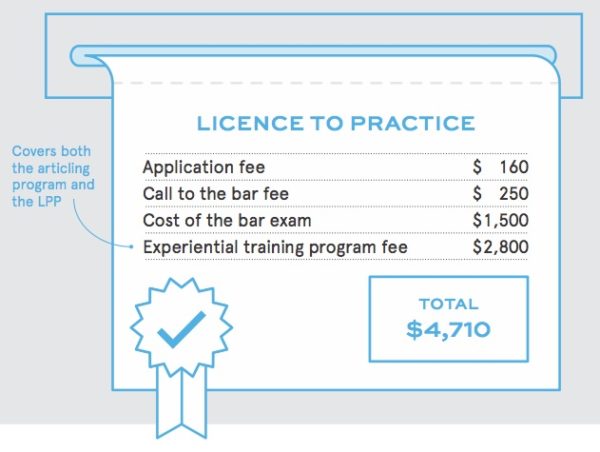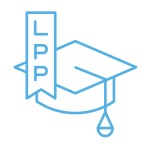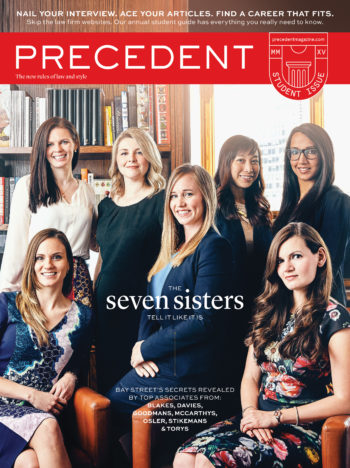
In early January, Joshua D’Cunha started to get nervous. Having just finished the four months of mostly online coursework that makes up the first half of the Law Practice Program (LPP) at Ryerson University, the 27-year-old was about to begin his second half: a four-month work placement at Infrastructure Ontario. While he felt confident that the coursework set him up for success, he was anxious about his future.
When the Law Society of Upper Canada launched the LPP last fall — in English at Ryerson and French at the University of Ottawa — its goal was twofold: to offer law grads a way to get licensed in Ontario without having to article (provided they pass the bar exam), and to devise a hands-on curriculum that would touch on a range of practice areas. After D’Cunha graduated from law school at the University of Windsor, he didn’t know what type of law he wanted to practise. He thought enrolling in the LPP made sense. But classmates and lawyers derided the program, insisting that employers would thumb their noses at LPP grads. Over time, D’Cunha recalls, that negativity sunk in: “I wondered, ‘Maybe this will haunt me for the rest of my career.’”
 Then he got to Infrastructure Ontario — and no one cared. “All they were concerned about was my ability to do the work,” says D’Cunha. After his placement, his boss hired him back, selecting him over an articling student.
Then he got to Infrastructure Ontario — and no one cared. “All they were concerned about was my ability to do the work,” says D’Cunha. After his placement, his boss hired him back, selecting him over an articling student.
“Taking an LPP student for a placement was a gamble,” admits Marni Dicker, general counsel at Infrastructure Ontario. “I didn’t know if my candidate would have top-notch skills.” But when D’Cunha arrived, he had something articling students rarely have: the ability to carry files from beginning to end. “Once he started working, we said, ‘Wow, you can do that? Here you go: this is your file. Check in when you need to,’” she says. “And I give full credit to the LPP.”
“Handling files is a key feature of the LPP,” says Chris Bentley, executive director of the program. Because the coursework divides students into simulated law firms, he explains, they get tasks most firms would never entrust to articling students — namely, handling files from start to finish. Guided by lawyer-mentors, LPP students carry mock files in a range of practice areas, such as criminal and real estate, interviewing clients (played by paid actors), drafting opinion letters and going to court. Dicker saw that preparation pay off for D’Cunha as soon as he arrived at her office. “After a month,” she says, “we almost began treating him like a junior lawyer.”
Dicker is not the only lawyer to rave about an LPP student. “Our student was up-to-speed and prepared to jump right in,” says Emily Lawrence, a partner who runs the student committee at Paliare Roland Rosenberg Rothstein LLP. And Jolie Lin, who runs the law student program at Bank of Montreal (BMO), praises her two LPP students. “I’m delighted by what I’m seeing,” she says. “It’s easy to assume these are students who couldn’t get jobs. But if we think that way, we risk losing top talent.”
 None of these students, however, got hired back. (At BMO, it’s simply their policy not to hire students after work placements.)
None of these students, however, got hired back. (At BMO, it’s simply their policy not to hire students after work placements.)
Perhaps the largest point of pride for the LPP is that, in its first year, the program found work placements for every student — all 221 of them. To make it happen, Bentley assembled a three-person placement team to guide students through the application process and to lobby employers to take part in the program. “We were at the office at times until 10 o’clock,” says André Bacchus, head of the placement team. “Then we’d be back at the office again on weekends catching up on paperwork.”
Despite that hard work, about 30 percent of the placements were unpaid. Yet Bentley insists it was a necessary compromise to ensure every student had a placement. “In an ideal world, every placement is paid,” he says. “But we don’t control the marketplace,” adds Bacchus. “Employers ultimately decide if they are willing to pay.”
With the second year of the program starting this fall, law students face one question: is it a wise career move to enrol in the LPP? Even supporters of the program admit the first batch of students will carry some stigma. But it will fade. “Once people that went through the LPP process have been practising lawyers for a couple of years,” predicts Lawrence, “it’s not going to matter.”

This story is from the 2015 edition of PrecedentJD Magazine
Photography by Jacklyn Atlas
